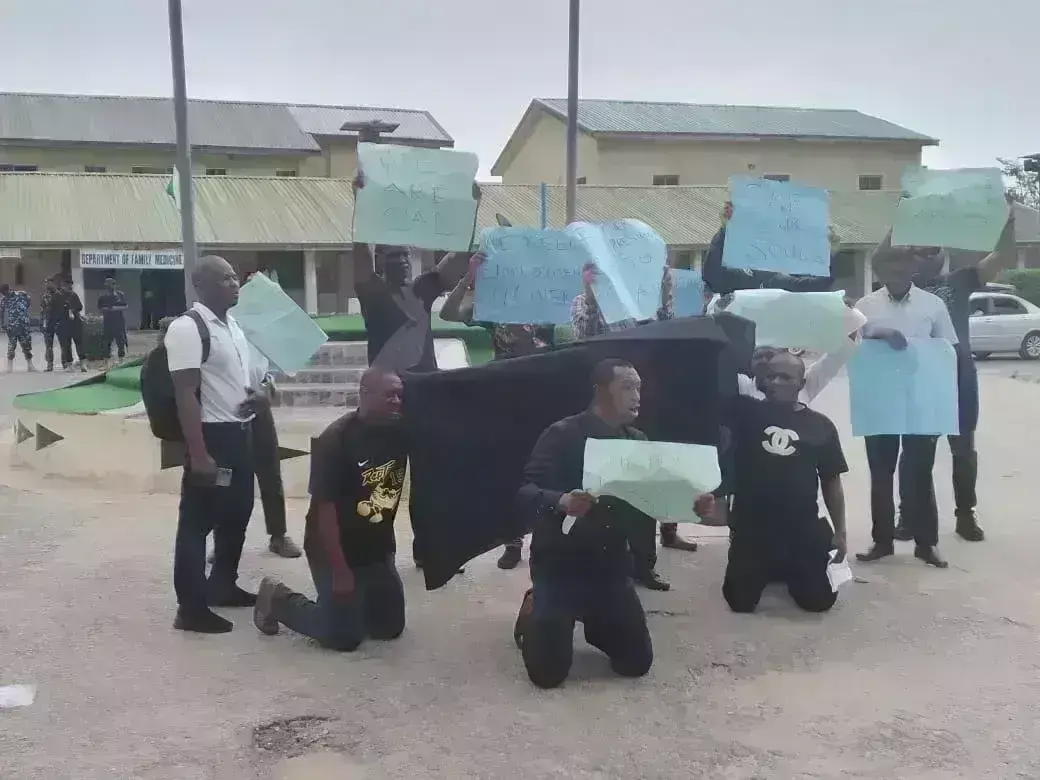Kogi doctors protest manpower shortage at federal teaching hospital

On Friday, the Association of Resident Doctors (ARD) at the Federal Teaching Hospital Lokoja (FTHL) protested the alleged shortage of manpower and work overload at the hospital.
Supreme News reports that the ARD members, who marched around the hospital premises, decried the shortage of manpower and overwork load on their members.
The doctors displayed placards with various inscriptions such as “We want to work, not to work and die,” “Don’t kill us, stop using no work, no pay to threaten us,” and “Federal Teaching Hospital Lokoja doctors are dying of help, among others.
The Chairman of the Nigeria Medical Association (NMA) Kogi Chapter, Dr. Olushola Baoku, who joined the protest, said the doctors were completely overworked without commensurate wages.
“The doctors are angry and sad, and of course, in extension, NMA is sad because of the event that is actually taking place in the Federal Teaching Hospital in Lokoja.
“We have communicated to the management three times in the last three months concerning the burning issues.
“We have hoped that the management of the hospital would have found a middle ground in resolving all these issues.
“People cannot be on duty for 48 hours, and there will be no food to eat. What if they collapse? Someone resuscitating another can collapse.
“I can’t imagine that with all the things Mr. President has put in place about workers, there are some doctors who are not getting the $35,000 wage award,” he said.
He expressed concern over how doctors were being casualized on a platform called GIFMIS with so many problems going on in the hospital.
He said, “We are also aware that FTHL, which had about 500 beds and had over 200 doctors before, now has 64 doctors as resident doctors.
“Before these doctors go and die one after the other or shut down the system, the federal government should quickly intervene and bring this problem to a reasonable end.”.
Baoku urged the management of FTHL to urgently address the issues of manpower shortages as well as improvements in the working conditions of the resident doctors.
In a swift reaction, management of FTHL has denied ARD’s allegations.
Dr Ebune Ojochide, the Chairman Medical Advisory Committee (CMAC) of FTHL, said the issue of manpower shortage in health sector remained a major challenge across the entire country as a result of the “Japa syndrome”.
Ojochide said the doctors needed to understand that there was administrative due process in the recruitment and replacement of workers into the federal institutions.
According to him, the Federal Government had put on hold the recruitment of workers in Nigeria including the health sector.
He said FTHL could not recruit without the approval from the relevant authority.
“An health institution like ours, cannot recruit without the approval of the federal government with the necessary cash backing to recruit.
“The management of the hospital has no power to recruit without the legal backing. If you recruit, it will be illegal, null and void.
“The recruitment of shortage of power affects the whole health institution in the country.
“Until we have the mandate and approval of the federal government to recruit medical staff, we cannot do it because there will be no cash backing,” he said.
He explained that the management of the FTHL, in the interim, had a temporary arrangement of bringing in local medical officers to fill some of the manpower gaps.
“We cannot afford to let the services collapse because doctors are leaving the country due to Japa syndrome.
“The salaries of the local staff and entitlements are being paid as and when due.
“Except that it is not permanent employment until the federal government gives the approval to convert them into permanent staff.
“So, this is the interim measure that has been taken by the hospital management to bridge the manpower shortage gaps.
“There are two platforms upon which staff are recruited in federal government personnel management, which are IPPIS and the Government Integrated Financial Management Information System (GIFMIS).
“The IPPIS is a platform for regular staff that are employed on a permanent basis and are pensionable, while the GIFMIS is a platform for temporary or non-regular staff,” he said.
He stressed that the local staff on the GIFIMS platform would also have the opportunity to be converted to permanent staff whenever the federal government gave approval for recruitment.
“So, it is not the casualization of staff as alleged by the ARD, but just an interim measure to fill the manpower shortage gaps, which is the only option we have to keep the services going,” he said.
On the issue of call meals, Ojochide said the provision of call meals was an incentive by the management of FTHL to encourage staff who were on call, saying, “It is the prerogative of the hospital management and not the right of staff.”.
He noted that the call meal was suspended by the hospital because of the sudden change of vendors by the ARD without following due process.
He insisted that the management was responsible for the payment for the call meal, and the ARD should have communicated with the management before disengaging the vendor, which was not their prerogative.
“So, the hospital management did not stop their call meal, but the ARD disengaged the vendor without the approval of the hospital management.”.
Ojochide therefore reaffirmed the commitment of the hospital management to continue to deliver quality healthcare services to the people of the state and Nigeria at large.
NAN reports that the ARD had embarked on the protest since Thursday and vowed to continue the protest on a daily basis until their demands were met.
There were heavy security personnel on the hospital premises, which the management said was to ensure the safety of lives and property and to prevent the breakdown of law and order.




